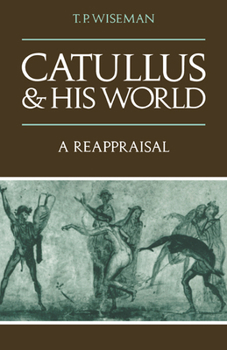Catullus and His World: A Reappraisal
Select Format
Select Condition 
Book Overview
This book is an attempt to read the poems of Gaius Valerius Catullus in his own context; to look at the poet and his works against the cultural realities of the first century BC as recent advances in historical research allow us to understand them. Catullus' own social background, the circumstances of the literary life of his time, the true extent of his works and the variety of audiences he addressed - these and other questions are explored by Professor Wiseman with new and startling results. Contemporary high society and politics are illustrated through Clodia and Caelius Rufus, considered not as mere adjuncts to Catullus' story but as significant historical personalities in their own right. A final chapter on nineteenth- and twentieth-century interpretations of Catullus' world shows how anachronistic preconceptions have prevented a proper understanding of it, and made this radical reappraisal necessary. Anyone with a serious interest in Latin literature or Roman history will want to read this book. Students in the upper levels of school or at university will find it essential background reading to their work on Catullus and Cicero's Pro Caelio.
Format:Paperback
Language:English
ISBN:0521319684
ISBN13:9780521319683
Release Date:September 1986
Publisher:Cambridge University Press
Length:304 Pages
Weight:0.95 lbs.
Dimensions:0.8" x 5.5" x 8.4"
Customer Reviews
2 ratings
Unusually good
Published by Thriftbooks.com User , 17 years ago
This book tells you most everything that can be known or guessed about Catullus, and it does so in a way that is both erudite and entertaining--a rare combination.
Everything You Wanted to Know about Catullus . . .
Published by Thriftbooks.com User , 25 years ago
...BUT WERE AFRAID TO ASK!This is a great book, and it's scholarly and exhaustively researched to boot. It's weird, because it's fun and great reading, but you really sense Wiseman's profound ability to get so close to something that is really so far away from our everyday lives--now this is scholarship! He's an intellectual but never haughty or boring. It'll make you want to read all of Catullus' poems right away in any kind of format. I can never tell people enough that it's okay to read Latin (or Greek) literature in translation.The last chapter, concerning Lesbia and modern poetry, is an amazing survey, tracing various poets' incarnations of the Divina Puella, from Marcus Antonius Flaminius' vision of Lesbia as a Medieval damsel-mannequin in distress, to Dorothy Parker's verdict of Lesbia as nothing more than ancient Rome's version of Holly Golightly. I rarely read introductions, but Wiseman's inspired me, especially when he says that "the imagination of one callow youth was caught" when he first read the poems of Catullus when he was 14. Certainly his imagination rivals Catullus' own.





